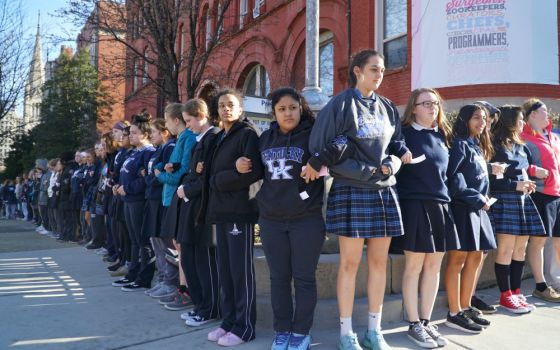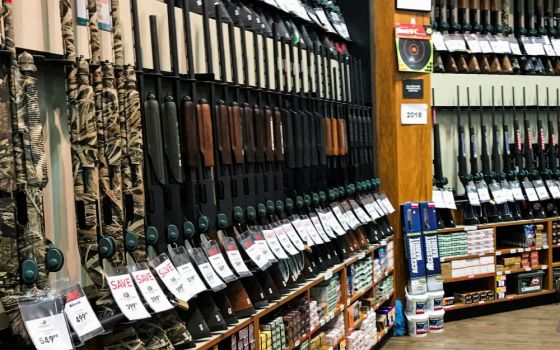"The vector of violence that converts a lot of interpersonal conflict into something much more fatal than an argument, or fistfight, is the gun," said pediatric surgeon Michael Hirsh in his address March 22 at the annual meeting for the Center for Nonviolent Solutions here in Worcester, Mass.
When Hirsh gave his address, the news reports and reactions to the shocking shooting of Florida teen Trayvon Martin were contradictory and raw. The pediatrician pointed out that while there were many unknowns concerning Martin's death, Florida's permissive gun laws are an established fact.
A recent article in the Tampa Bay Times supports Hirsh's observation. The Florida daily reported that the "Gunshine" state is serving as a proving ground for pro-gun legislation.
"From bring-your-guns-to-work laws to all-out bans on local gun restrictions, Florida has become a haven for Second Amendment enthusiasts. Statistics show the pro-gun agenda has triggered more gun sales, more permits, and a sharp rise in justifiable homicides," writes journalist Toluse Olorunnipa.
Olorunnipa reports that Florida has about 900,000 licensed concealed weapons carriers, far more than any other state, including Texas. The number of requests for concealed gun licenses is increasing at an alarming rate. In February alone, there were a record 53,835 requests.
In addition to increasing gun accessibility, Florida penalizes those who offend the rights of gun-owners. County commissioners who try to regulate gun use can be fined $5,000. Municipalities that keep records of gun owners can be fined up to $5 million. Police departments that arrest someone later found to be innocent under the state's "stand your ground" law can be sued. And doctors who discuss gun safety with their patients risk high fines and loss of license.
No, I am not making this up.
The "Docs vs. Glocks" gag law, passed last June by Gov. Rick Scott and a Republican-controlled legislature, prohibits a physician or health care professional from asking patients if they own a gun or keep one in the house and forbids denying care to those who refuse to answer such questions. The law also prohibits entering any information on firearm ownership into medical records.
An early version of the measure made violation of the gag law a third-degree felony punishable by up to five years in prison and a fine of $5 million. The consequences have since been reduced to disciplinary action by the state health department that could include the loss of a medical license and a fine of up to $10,000.
Supporters of the gag rule said docs asking their patients about guns and gun safety was akin to "pushing a political agenda" in the exam room and "unnecessarily harassing."
But what of the unnecessary fatalities that are resulting from unchecked gun access?
As I write this column, the news is reporting on yet another mass shooting, this one at a small Christian college in Oakland, Calif., that offered degrees in nursing and theology. On Monday, a distraught former student stood up in a classroom and began randomly firing his gun, ultimately killing seven people. Students who expected to be listening to lectures on God or the human anatomy suddenly found themselves dodging bullets. The assailant later told police he was angry with a school administrator who he said had teased him for his poor English.
While such massacres momentarily capture national attention, they reveal just the tip of the iceberg of what is fast becoming a public health problem -- injury or death by gun.
Consider:
- Every day, 150 Americans are shot, half of them fatally.
- The rate of unintentional firearm deaths among American children is nine times higher than in 25 other industrialized countries combined.
- Every day, two teens commit suicide with guns, the vast majority with their parents' firearms. Unlike other methods such as drugs or cutting, suicides by gun succeed 90 percent of the time.
- Although kids and guns are a proven lethal mix, one-third of U.S. households with children younger than 18 have a firearm. Of these, more than 40 percent store them unlocked; of this last subset, one-quarter store their guns loaded.
"[U]nsecured guns in the home have cost thousands of young people's lives as they transfer momentarily adolescent depressions over romantic break-ups or bad grades into unspeakable tragedies," says Dennis Henigan, author of Lethal Logic: Exploding the Myths that Paralyze American Gun Policy.
I personally know of one such tragedy. A hunting rifle killed the son of my parents' best friend. Upset with how a teacher had treated him, Frank, a lively, gregarious child, went out into the woods one afternoon and shot himself. He was only 12 years old. What was probably a moment of preteen turmoil became a devastating and unnecessary tragedy for his family because of a gun. Had a doctor talked to his parents about gun safety, Frank's death might have been avoided.
Last summer, physicians and medical societies, including the American Association of Pediatrics, filed a lawsuit against Florida's gag law. In September, a U.S. district judge blocked the law's enforcement. The victory, though important, is a small one given the plethora of pro-gun laws in Florida and elsewhere.
"Docs vs. Glocks" indicates how extreme the defense of Second Amendment rights has become in this country. Pro-gun advocates are protecting that right at the expense of public health. Easy access to guns is turning our worksites and public places -- schools, college campuses, malls -- into killing zones. As a society, we have collectively banned cigarette smoking from just about everywhere in attempt to protect our lungs. We need to do the same with guns.
As Dr. Hirsh said, they are "the vector" of so much violence.




